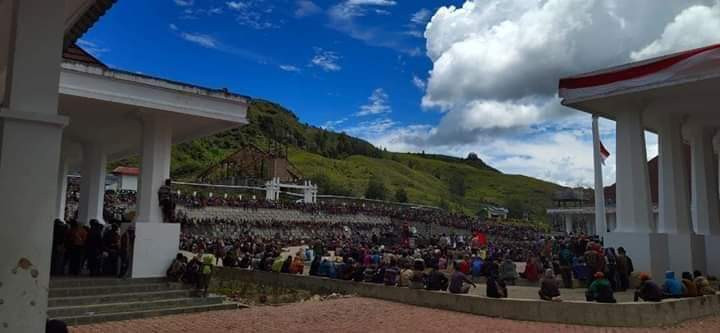Popular Reads
Top Results
Can't find what you're looking for?
View all search resultsPopular Reads
Top Results
Can't find what you're looking for?
View all search resultsRights body questions government commitment to human rights
Change text size
Gift Premium Articles
to Anyone
T
he sluggish handling of past human rights violations has raised questions about the government’s commitment to resolve them, as the National Commission on Human Rights (Komnas HAM) declared 2019 a “gloomy” year for the human rights agenda.
The commission cited its frustrations at the current back-and-forth with the Attorney General’s Office (AGO) after the latter sent back preliminary investigation dossiers on the Paniai tragedy in Papua, reportedly citing administrative errors.
The case, widely referred to as the Bloody Paniai case, occurred when security forces opened fire at a crowd of demonstrators in the Karel Gobay Field in Madi district, Paniai regency in December 2014. The incident, which was declared a “gross human rights violation” by Komnas HAM in February this year, claimed the lives of five students and left 21 other civilians injured.
The commission has written twice to President Joko “Jokowi” Widodo providing options for resolving past human rights abuses, Komnas HAM commissioner Amiruddin Al Rahab recently said, to little effect.
He argued that the Paniai incident presented an opportunity for the government to take that first step toward resolving past cases.
“The time span of the cases [may be too] long. We believe that the recent incidents could be solved first if there was the will to do so,” said Amiruddin.
“Komnas HAM has fulfilled all the material requirements necessary for an investigation, so it is up to the attorney general to use the human rights paradigm in solving these cases.”
According to Komnas HAM’s own records, at least 11 other cases of alleged gross human rights abuses have been left in abeyance since the commission submitted its dossiers to the AGO. Among them are the Trisakti and Semanggi shootings between 1998 and 1999.
Read also: Jokowi vows to settle past human rights abuse cases. But which ones?
A leading expert at the Office of the Presidential Staff (KSP), Donny Gahral Adian urged the AGO to resolve the Paniai case as soon as possible, saying that the government could not afford to have its commitment to human rights thrown into doubt.
“If there is such a case like Paniai, the government urges the AGO to resolve the case as quickly as possible so that [the facts become] clear and the victims are afforded their rights,” he said.
“To be clear, [the government’s] commitment to upholding human rights cannot be doubted because the government wants rights to be respected, valued and upheld – in line with Pancasila.”
Read also: 'We demand proof, not promises': Papuans urge Jokowi to bring justice to Paniai tragedy
The commission has questioned the AGO’s insistence that it must provide complete evidence of its investigation into cases of human rights abuses, although it is not legally allowed to do so.
Citing Law No. 26/200 on human rights courts, commissioner Munafrizal Manan has said that Komnas HAM is authorized only to conduct a penyelidikan (preliminary investigation), which determines whether or not a case constitutes a violation.
Read also: Palace denies 2014 Papua killings constitute gross human rights violation
The investigation dossier of the Paniai case has been returned twice to Komnas HAM, on March 19 and May 20, with the AGO arguing that the dossier had yet to satisfy requirements.
AGO spokesman Hari Setiyono denied Komnas HAM’s claim that it was reluctant to follow up on past human rights abuses, saying that the office had also given clear instructions for the commission to be able to meet administrative requirements.
“The letter from the Attorney General as a penyidik [investigator] to the Komnas HAM’s penyelidik [examiner] is very clear on that. There is no reluctance on the government’s part, in this case the AGO, in processing this case,” Hari told The Jakarta Post via text messages last week.
In its annual report, Komnas HAM said that 2019 was a “gloomy” year for human rights, noting that progress on the issue was sluggish as politics took center stage last year.
The commission highlighted several key events, including riots in Jakarta in May following protests over the result of the presidential election, and another riot in September following mass protests against the House of Representatives’ plan to sign controversial bills into law.
“We all know that the situation is not conducive for human rights as there are many instances of hate speech, as well as the May’s riots,” said Amiruddin. “Those claimed people’s lives and until now, have not been properly investigated.”
Komnas HAM received 2,757 complaints from the public across Indonesia last year. The top four complaints were related to rights to welfare (1,119 complaints), rights to justice (888 complaints), rights to safety (130 complaints) and the right to life (93 complaints).
The majority of the complaints were related to land and labor disputes as well as unlawful conduct in law enforcement and threats of violence, among others.
“This shows that the basic rights of human beings are still an issue in this country,” said Munafrizal.










